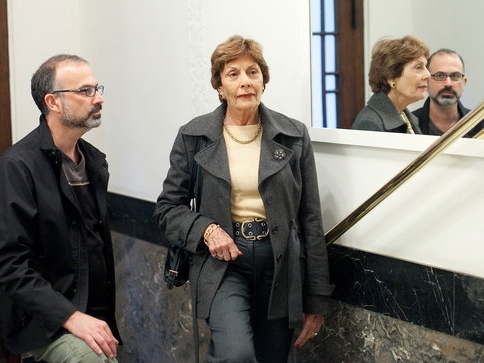
Documentary filmmaker Arnon Goldfinger has a sense for a good story. He just didn’t expect to find the one he discovered while filming a tribute to his 98-year-old grandmother.
Goldfinger’s new film, “The Flat,” began as a brief ode to his late grandmother’s decades-long home in Tel Aviv. He intended to capture his family poring over her flat, examining both the woman’s life and the trail of paperwork, letters and other collectibles we often leave behind.
What Goldfinger discovered proved impossible not to make a feature-length film, even if it meant unleashing family skeletons his own mother wanted to keep buried.
“The Flat,” now showing in select cities, connects Goldfinger’s Jewish family lineage to German Nazis in uncomfortable ways. That left Goldfinger torn between his obligations as a filmmaker, a son and a grandson, he tells Big Hollywood.Curiosity eventually prevailed even if he was shocked by what he uncovered.
“The Flat” may explore events from more than a half century ago, but Goldfinger entered the story from a different vantage point.
“I’m not making a film about the past. I’m making a film about the perspective of people living through this past,” he says. That approach carries through the visual presentation, one spiked with both imagination and humor. “The Flat” doesn’t get bogged down in re-enactments or archive materials.Goldfinger’s family legacy may betray some ugly ties with the Nazi regime, but “The Flat” isn’t a morose affair.
“Many people think making a film about history … about war … about the Holocaust, it might be heavy, dramatic and traumatic,” he says. “I don’t see things like that … you can find irony everywhere. It’s how I look at life.” Laughter also helps the audience process some of the darker revelations, he adds.
“The Flat” hit theaters in Israel last year to broad success and more recently started screening in Germany. Goldman says audiences in each country reacted differently to his film.
For example, Israelis showed sympathy for the daughter of a Nazi featured in the film.
The director says he tries to use his films as a reflection on his life, something which began with his 1999 debut, “The Komediant.” With “The Flat,” he carried through with that mission knowing he would spend years nursing a project that would force him to confront his own past. He came away from “The Flat” satisfied all the same.
“I really try to ask myself, ‘what would be the meaning of making such a film on my life?’ For the time ever I did a film that I can feel I’m answering that question in the right way,” he says.

COMMENTS
Please let us know if you're having issues with commenting.